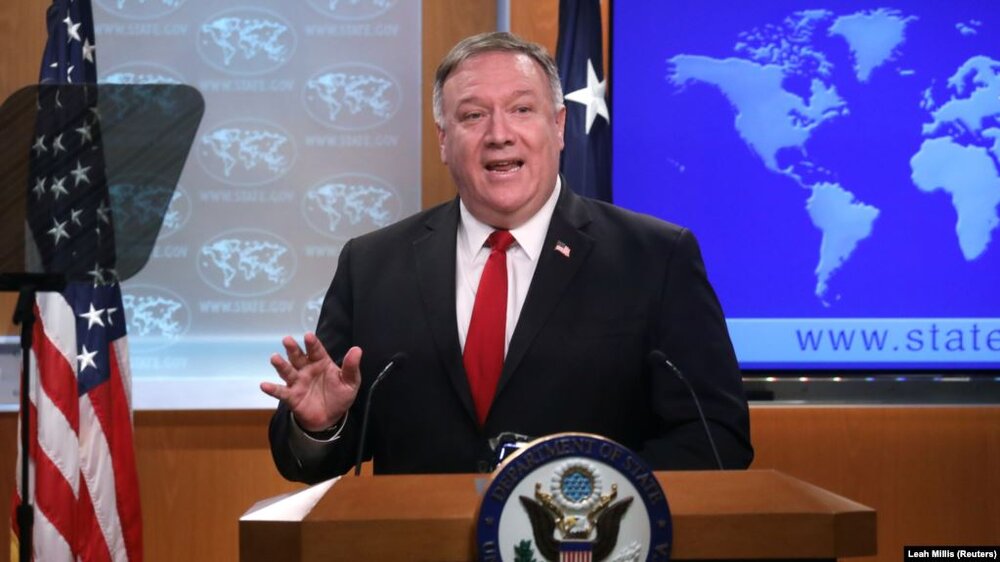Pompeo frustrated as UN Security Council rejects to extend arms embargo on Iran

Secretary of State Mike Pompeo on Friday condemned the United Nations Security Council for rejecting a U.S. resolution to extend the arms embargo on Iran, Politico reported.
The council voted to allow the 13-year embargo to expire this October despite the protestations of the U.S., Israel and some Arab states.
"The Security Council’s failure to act decisively in defense of international peace and security is inexcusable," Pompeo said in a statement.
Earlier Friday, Pompeo said allowing the embargo to expire would be "just nuts."
Russia and China — two permanent members of the Security Council — had opposed the push for an indefinite extension. The Russian delegation asserted an extension would violate a UNSC resolution that endorsed the Iran nuclear deal. It said the U.S. forfeited its right to negotiate the terms of an arms embargo under that resolution because it left the nuclear deal in 2018.
Russian President Vladimir Putin invited the heads of the Security Council, Germany and Iran to meet to "outline steps that can prevent confrontation or a spike in tensions in the UN Security Council," according to a statement from the country's delegation.
France, Germany and the United Kingdom had also pushed back on a U.S. threat to impose sanctions on Iran if the Security Council voted to let the embargo expire. The U.S. negotiated the right to do so under the 2015 Iranian nuclear deal. But the European countries argued the U.S. was not in a position to use the so-called snapback option after withdrawing from the Iran nuclear deal in 2018.
President Donald Trump and French President Emmanuel Macron spoke before the vote and discussed the measure to extend the arms embargo, according to a White House readout. But the French delegation ultimately voted to abstain, saying the measure "does not constitute an appropriate response to the challenges posed by the expiry of the embargo and because it is not likely to advance the security and stability of the region, as it cannot gather the support of the Council, nor is it a sufficient basis for working towards a consensus."
Speaking in Vienna on Friday, just as the Security Council started voting on the embargo extension, Pompeo brushed aside the Trump administration's contentious withdrawal from the nuclear deal, saying Iranian arms dealings were a separate issue.
"We don't think Iran has given any indication that it is in a place remotely where the world [should] sell them high-end weapon systems," he said.
In his statement, the secretary characterized the Security Council's vote as neglecting the needs of the Persian Gulf states and Israel, who had also requested an extension to the embargo.
"These countries know Iran will spread even greater chaos and destruction if the embargo expires, but the Security Council chose to ignore them," Pompeo said in the statement. "The United States will never abandon our friends in the region who expected more from the Security Council."
Contrary to claims by Pompeo, Mutlaq bin Majed al-Qahtani, a senior Qatari Foreign Ministry official, has said that the latest anti-Iran stance of the Persian Gulf Cooperation Council does not reflect the position of member states.
In an interview with al-Jazeera on Wednesday, he said that the council’s positions are usually taken and announced at foreign ministerial meetings and that the latest stance of its General Secretariat on extension of arms embargo on Iran does not reflect the position of member states.
“We in Qatar do not think that current sanctions on Iran would lead to positive results and contribute to the resolution of crises. Crises must be overcome through dialogue and negotiations,” Press TV quoted him as saying in the interview.
“Iran is a neighboring country with which we have good neighborly relations, and it enjoys a position that the State of Qatar, the government and the people value, especially during the unjust blockade on Qatar,” Qahtani noted.
The PGCC includes the six Arab countries of Saudi Arabia, the UAE, Bahrain, Oman, Qatar, and Bahrain that lie on the southern shores of the Persian Gulf.
Analysts and politicians are unanimous in their views that the PGCC is under the influence of Saudi Arabia. In fact, Saudi Arabia bullies small countries in the council to give in to its demands.
PA/PA
